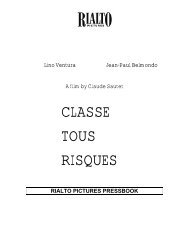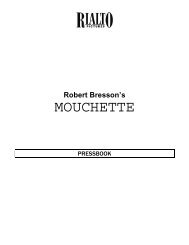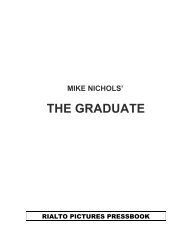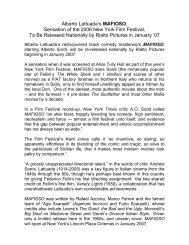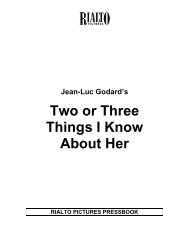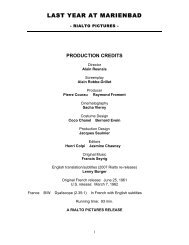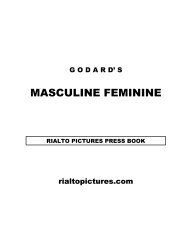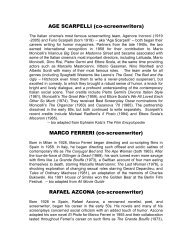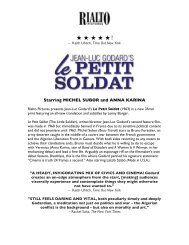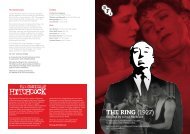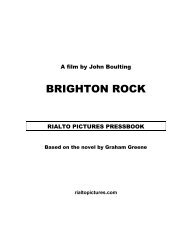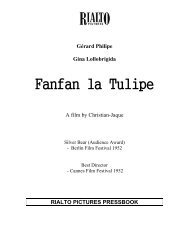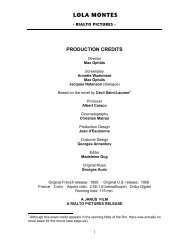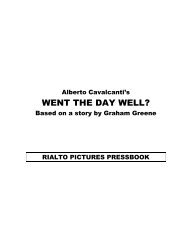Two or Three Things I Know About Her - Rialto Pictures
Two or Three Things I Know About Her - Rialto Pictures
Two or Three Things I Know About Her - Rialto Pictures
Create successful ePaper yourself
Turn your PDF publications into a flip-book with our unique Google optimized e-Paper software.
Jean-Luc Godard’s<br />
<strong>Two</strong> <strong>or</strong> <strong>Three</strong><br />
<strong>Things</strong> I <strong>Know</strong><br />
<strong>About</strong> <strong>Her</strong><br />
RIALTO PICTURES PRESSBOOK<br />
2
CREDITS<br />
Direct<strong>or</strong>/Screenwriter<br />
Jean-Luc Godard<br />
Based on articles by Catherine Vimenet 1<br />
Executive Producer<br />
Anatole Dauman<br />
Producer<br />
Philippe Dussart<br />
Cinematography<br />
Raoul Coutard<br />
Edit<strong>or</strong><br />
Françoise Collin<br />
Costume Designer<br />
Gitt Magrini<br />
Music<br />
Ludwig van Beethoven (from "Quartet no. 16")<br />
Sound<br />
René Levert<br />
Subtitles (2006 <strong>Rialto</strong> re-release)<br />
Lenny B<strong>or</strong>ger<br />
France 1967<br />
Col<strong>or</strong> Scope<br />
running time: 84 minutes<br />
An Argos Films – Les Films du Carrosse – Anouchka Films – Parc Films<br />
co-production<br />
A RIALTO PICTURES RELEASE<br />
1 Vimenet’s articles exposing prostitution among Paris housewives <strong>or</strong>iginally appeared in<br />
the newsweekly Le Nouvel Observateur (1966)<br />
3
CAST<br />
Juliette Janson<br />
Marina Vlady<br />
Robert Janson, her husband<br />
Roger Monts<strong>or</strong>et<br />
Roger, Robert’s friend<br />
Jean Narboni<br />
Marianne<br />
Anny Duperey<br />
Monsieur Gérard<br />
Joseph Gehrard<br />
Christophe, Juliette's son<br />
Christophe Bourseiller 2<br />
John Bogus (the American journalist)<br />
Raoul Lévy<br />
Bouvard and Pécuchet 3<br />
Claude Miller and Jean-Patrick Lebel<br />
The writer<br />
Jean-Pierre Laverne<br />
The student<br />
Blandine Jeanson<br />
Girl who talks to Robert<br />
Juliete Berto<br />
Narrat<strong>or</strong><br />
Jean-Luc Godard<br />
2 B<strong>or</strong>n in 1957, Bourseiller went on to a prominent multi-faced career as a film and stage<br />
act<strong>or</strong>, journalist, novelist and teacher. He appeared in two other Godard films.<br />
3 “Bouvard and Pécuchet” are the encyclopaedist heroes of Flaubert’s unfinished<br />
eponymous comic novel. Godard’s two act<strong>or</strong>s, Miller and Lebel, went on to become<br />
filmmakers, notably Miller, who also w<strong>or</strong>ked as Godard’s unit manager.<br />
4
François Truffaut 4 on<br />
“<strong>Two</strong> <strong>or</strong> <strong>Three</strong> <strong>Things</strong> I <strong>Know</strong> <strong>About</strong> <strong>Her</strong>”<br />
Why did I join the producers of <strong>Two</strong> <strong>or</strong> <strong>Three</strong> <strong>Things</strong> I <strong>Know</strong> <strong>About</strong> <strong>Her</strong>? Is it<br />
because Jean-Luc has been a friend of mine f<strong>or</strong> nigh on twenty years <strong>or</strong> because<br />
Godard is the greatest filmmaker in the w<strong>or</strong>ld?<br />
Jean-Luc Godard is not the only one who films as he breathes, but he is the one<br />
who breathes best. He is quick like Rossellini, wicked like Sacha Guitry, musical<br />
like Orson Welles, simple like Pagnol, hurt like Nicholas Ray, effective like<br />
Hitchcock, profound, profound, profound like Ingmar Bergman and insolent like<br />
nobody else.<br />
Even those who hate Godard, sitting in the dark bef<strong>or</strong>e one of his films, well,<br />
even if they don't understand a thing, I guarantee you that they won't miss a beat.<br />
In other w<strong>or</strong>ds, just as the O.R.T.F. 5 examines audience ratings, you could<br />
measure the intensity in an audit<strong>or</strong>ium while a Godard film is being projected and<br />
you would find that he knows how to make himself heard and watched like<br />
nobody else.<br />
He is the one who killed off the two <strong>or</strong> three w<strong>or</strong>st things I know about the public:<br />
polite indifference, vague interest, amused condescension. His auth<strong>or</strong>ity, since<br />
that is what we are talking about, is such that you might call it a good-luck charm<br />
<strong>or</strong> an infallibility curse. Will Jean-Luc Godard become m<strong>or</strong>e popular than the<br />
Pope, that is to say, just a little less than the Beatles? It's possible. Profess<strong>or</strong><br />
Chiarini has stated, “There is the cinema pre-Godard and post-Godard.” That's<br />
true, and as the years go by we grow m<strong>or</strong>e certain that Breathless (1960) marked<br />
a crucial turning point in the cinema, just as Citizen Kane did in 1940. Godard<br />
has pulverized the system, he has turned the cinema inside out, just as Picasso<br />
did in painting, and like him, he has made everything possible. France, f<strong>or</strong>merly<br />
called Gaul, is turning into a country with a population of f<strong>or</strong>ty-five million<br />
cinéastes. Filming from m<strong>or</strong>ning till night, it is a real pleasure to see him and to<br />
act as the financier of such a brilliant “savate” fighter 6 .<br />
M<strong>or</strong>e soberly, I can conclude by saying that I became the co-producer of Jean-<br />
Luc Godard's thirteenth film because I noticed that the people who invested<br />
money in his twelve previous masterpieces have all become rich.<br />
-- excerpted from French Boxing and Finance, <strong>or</strong> <strong>Two</strong> <strong>or</strong> <strong>Three</strong> <strong>Things</strong> I <strong>Know</strong><br />
<strong>About</strong> Him<br />
4 Truffaut’s Films du Carrosse was one of the film’s four production companies.<br />
5 the f<strong>or</strong>mer French radio and television broadcasting c<strong>or</strong>p<strong>or</strong>ation<br />
6 “savate” is a f<strong>or</strong>m of French boxing<br />
5
Vincent Canby on “<strong>Two</strong> <strong>or</strong> <strong>Three</strong> <strong>Things</strong>…”<br />
Filmographically speaking, Jean Luc Godard’s <strong>Two</strong> <strong>or</strong> <strong>Three</strong> <strong>Things</strong> I <strong>Know</strong><br />
<strong>About</strong> <strong>Her</strong> comes after Alphaville, Pierrot le Fou and Masculine Feminine, all<br />
made in 1965, and it precedes several sh<strong>or</strong>t films as well as the features La<br />
Chinoise (1967), Weekend, Le Gai Savoir and One Plus One (also called<br />
Sympathy f<strong>or</strong> the Devil), all made in 1968.<br />
I go into this detail because Godard in each of his films, constantly directs our<br />
attention to the place an individual film takes in relation to his other films, and<br />
because the direct<strong>or</strong> has repudiated these earlier w<strong>or</strong>ks and is now rep<strong>or</strong>tedly<br />
devoting himself to filmmaking as a revolutionary activity, rather than to making<br />
revolutionary films. There is a difference.<br />
<strong>Two</strong> <strong>or</strong> <strong>Three</strong> <strong>Things</strong> I <strong>Know</strong> <strong>About</strong> <strong>Her</strong> does not, as some have said, mark the<br />
end of Godard’s “classical” period (he didn’t abandon people and people-in-place<br />
until after Weekend), but it does dramatize the beginning of Godard as the f<strong>or</strong>mal<br />
movie essayist.<br />
The film coolly, and in strikingly beautiful images (many of which are dominated<br />
by the s<strong>or</strong>t of red that would rivet the eye of a child), pictures the situation (it does<br />
not tell a st<strong>or</strong>y) of a thirtyish Parisian housewife who becomes a part-time<br />
prostitute to help pay f<strong>or</strong> the telly, the clothes, the car and the apartment she<br />
shares with her husband and children in one of Paris’s new housing projects.<br />
Alternating with these scenes are shots of the construction of the “new” Paris that<br />
is arising around Juliette, and all the people like her, to f<strong>or</strong>m a concrete and steel<br />
environment that effectively makes prostitutes of them all. On the soundtrack,<br />
Godard whispers “petites lectures” on everything from politics and the meaning of<br />
w<strong>or</strong>ds to the separation between emotion and thought, between thought and<br />
w<strong>or</strong>d, and between w<strong>or</strong>d and the meaning communicated.<br />
In a similar way is Juliette separated from Paris (actually, the 20 th<br />
arrondissement), the “her” of the title. Godard’s preoccupation with vocabulary<br />
and syntax as weapons of political and psychological repression (which is what<br />
Le Gai Savoir is all about) keeps cropping up throughout <strong>Two</strong> <strong>or</strong> <strong>Three</strong> <strong>Things</strong> I<br />
<strong>Know</strong> <strong>About</strong> <strong>Her</strong> in narration, in interviews-as-dialogue, and even in posters.<br />
The ideas—which come in the f<strong>or</strong>m of Godard’s interrogation of himself and of<br />
the beliefs that shaped the self-proclaimed Maoist of today—are lucidly, often<br />
hum<strong>or</strong>ously, presented by Raoul Coutard’s camera that expl<strong>or</strong>es faces, rooms,<br />
buildings, cars, Coke bottles, and Ajax cans, all with Brechtian dispassion. It’s a<br />
lovely film and should be seen... -- New Y<strong>or</strong>k Times, May 1, 1970<br />
6
James Monaco on “<strong>Two</strong> <strong>or</strong> <strong>Three</strong> <strong>Things</strong>…”<br />
<strong>Two</strong> <strong>or</strong> <strong>Three</strong> <strong>Things</strong> I <strong>Know</strong> <strong>About</strong> <strong>Her</strong> may very well be Godard's most<br />
consummate film. It began with an article about prostitution in the new suburbs of<br />
Paris published in Le Nouvel Observateur. The "elle" of the title is Juliette<br />
(Marina Vlady), as well as Paris. "During the course of the film," Godard<br />
explained, "I want to include everything; sp<strong>or</strong>t, politics, even groceries." This is<br />
Godard at his best, jostling images and sounds, w<strong>or</strong>ds and meaning, in a<br />
symphony of ideas: Juliette, the victim of the Paris suburban housing complex,<br />
the war in Vietnam, the poetry of consumer goods, the French fascination with<br />
America, the exploitation of women, her own indifference. . . .<br />
<strong>Two</strong> of the imp<strong>or</strong>tant scenes of the film take place in cafés, as do so many key<br />
scenes in Godard. In one there's a series of quick shots, each one a closer<br />
enlargement of a coffee cup until finally the cup fills the center of the scope<br />
image.<br />
We hear Godard on the soundtrack: "Perhaps an object like this will make it<br />
possible to link up, to move from one subject to another, from living in society, to<br />
being together. But then, since social relationships are always ambiguous, since<br />
my thought is only a unit, since an immense moat separates the subjective<br />
certitude that I have f<strong>or</strong> myself from the objective truth that I am f<strong>or</strong> others, since I<br />
never stop finding myself guilty, even though I feel innocent, since every event<br />
transf<strong>or</strong>ms my daily life, since I always seem to fail to communicate . . . since...<br />
since . . . since I can't tear myself away from the objectivity that crushes me, n<strong>or</strong><br />
from the subjectivity that isolates me, since it isn't possible f<strong>or</strong> me either to raise<br />
myself into Being, <strong>or</strong> to fall into Nothingness . . . , it's necessary that I listen, it's<br />
necessary that I look around me m<strong>or</strong>e than ever . . . the w<strong>or</strong>ld . . . my fellow<br />
creatures . . . my brothers."<br />
This is not a film talking. It is a man. It's the most personal moment in all of<br />
Godard. Poets sometimes speak to us directly but filmmakers seldom do.<br />
Throughout this long monologue shimmering black coffee swirls in the cup. The<br />
spoon stirs the sugar. The sharp light refracts in the bubbles that f<strong>or</strong>m, turn<br />
slowly, slowly on the surface, and then annihilate themselves. Godard is a great<br />
filmmaker because he makes great cinema out of a close-up of a coffee cup and<br />
a narrative of his own thoughts about his own feelings.<br />
<strong>Two</strong> <strong>or</strong> <strong>Three</strong> <strong>Things</strong> I <strong>Know</strong> <strong>About</strong> <strong>Her</strong> won the Prix Marilyn Monroe du Cinéma,<br />
awarded by an all-woman jury including Marguerite Duras and Fl<strong>or</strong>ence Malraux.<br />
-- excerpted from Godard entry in W<strong>or</strong>ld Film Direct<strong>or</strong>s – Volume <strong>Two</strong>, Edited by<br />
John Wakeman (1988, H. W. Wilson Company)<br />
7
Marina Vlady: “Godard et Moi”<br />
Godard and I had separately read the rep<strong>or</strong>tage in the Nouvel Observateur<br />
[newsweekly]. We had discussed it as two friends who read might discuss an<br />
article in the Nouvel Observateur. At that time Jean-Luc wanted to make a film of<br />
Balzac's The Lily of the Valley. After our conversations, he dropped the idea. <strong>Two</strong><br />
<strong>or</strong> <strong>Three</strong> <strong>Things</strong> used several cases mentioned in the Nouvel Observateur probe:<br />
the girl who lives in her first modern apartment and who keeps taking baths<br />
without realizing how expensive it is; the old man who sub-leases his apartment<br />
f<strong>or</strong> "tricks"; the girls who turn the basement into a brothel, etc. And there's this<br />
girl, Juliette, to whom I lend my features—because with Godard you can't really<br />
talk about acting. Obviously, in the film Godard makes comments about life in<br />
Paris, the condition of women, the war in Vietnam, etc. F<strong>or</strong> him, prostitution is<br />
simply a pretext, <strong>or</strong> rather an extreme, a caricature. I know this film might irritate<br />
viewers just like certain readers failed to grasp the sense of the Nouvel<br />
Observateur article. I'm very fond of this film. Would I behave as Juliette does if I<br />
found myself in similar conditions? I think I would. But you know, Juliette doesn't<br />
prostitute herself to eat. She has enough to live on. She wants to buy herself<br />
dec<strong>or</strong>ations, dresses, not let mediocrity destroy her femininity. When I read the<br />
Nouvel Observateur article, I said to myself that life was po<strong>or</strong>ly <strong>or</strong>ganized and<br />
that we had to say so. Still, I don't think Godard wanted to make a "realist" film<br />
about prostitution in the housing projects. He wanted to speak out on society<br />
today and also raise awareness, inf<strong>or</strong>m." – from Le Nouvel Observateur, March<br />
8, 1967<br />
Richard Roud on “<strong>Two</strong> <strong>or</strong> <strong>Three</strong> <strong>Things</strong>...”<br />
<strong>Two</strong> <strong>or</strong> <strong>Three</strong> <strong>Things</strong> I <strong>Know</strong> <strong>About</strong> <strong>Her</strong> is, in Godard's own w<strong>or</strong>ds, a sociological<br />
essay in the f<strong>or</strong>m of a novel but written, not with w<strong>or</strong>ds, but with notes of music. It<br />
is much m<strong>or</strong>e ambitious than Made in U.S.A., both in its subject-matter, which<br />
deals with the whole Parisian region—the 'her' of the title—and in its f<strong>or</strong>m. "At<br />
this moment," wrote Godard, "the whole area round Paris is being re<strong>or</strong>ganized.<br />
On a vast scale, the region is being transf<strong>or</strong>med; and what strikes me is that it is<br />
really being rearranged as a huge brothel. One finds here all the things that<br />
characterize the brothel: the inhabitants are obedient and docile, and they are<br />
prostituting themselves. If I have filmed a prostitute, it is because I wanted to<br />
show this…" In sh<strong>or</strong>t, the film is a kind of apotheosis of Godard's feelings about<br />
prostitution in modem life.<br />
The idea came from an exposé in Le Nouvel Observateur which showed how<br />
many of the women residing in the new low-cost high-rise housing complexes<br />
res<strong>or</strong>t to casual prostitution in <strong>or</strong>der to make ends meet. The practice has<br />
become so common, apparently, that there is even a name f<strong>or</strong> them: 'shooting<br />
8
stars'. The economic reasons f<strong>or</strong> this, as Godard explained in an interview, are<br />
that most of these women have been f<strong>or</strong>cibly re-located in these dreary buildings<br />
outside the city. Their flats are modem, with central heating and all modem<br />
conveniences, but they are not allowed to bring with them their old furniture—f<strong>or</strong><br />
fear of woodw<strong>or</strong>m—and so they have the initial expense of refurnishing the<br />
house. Then there is the cost of moving, charges f<strong>or</strong> connecting gas and light,<br />
and furtherm<strong>or</strong>e many of them, carried away by their new-found luxury, run up<br />
heavy bills f<strong>or</strong> gas and electricity. From the very beginning they are in debt.<br />
Faced with the necessity of paying off these debts, and m<strong>or</strong>e imp<strong>or</strong>tant, aff<strong>or</strong>ding<br />
all the luxuries with which our consumer society tempts us, many of these<br />
women go into Paris (some once a week, some only at the difficult end of the<br />
month), to prostitute themselves. Returning home with a full grocery bag, they<br />
are much appreciated f<strong>or</strong> their 'clever management' by their unsuspecting—<strong>or</strong><br />
complaisant—husbands.<br />
This is the pretext f<strong>or</strong> the film, and it also gives it a basic structure: twenty-four<br />
hours in the day of one of these 'shooting stars', an attractive young housewife<br />
(played by Marina Vlady) who lives with her garage mechanic husband and their<br />
two children in a housing complex. The film begins one evening and ends the<br />
next, during which time she has spent the day in Paris. . . .<br />
His model, in some respects, has been Francis Ponge, a French poet who began<br />
during the last war to write little poems in prose which are neither m<strong>or</strong>e n<strong>or</strong> less<br />
than the descriptions of objects….When Godard shows us f<strong>or</strong> what seems like<br />
two <strong>or</strong> three minutes a shot of a coffee-cup seen from above, with the bubbles<br />
first gradually separating, then re-f<strong>or</strong>ming into a circle in the centre, then<br />
redispersing, one feels one is experiencing something much m<strong>or</strong>e imp<strong>or</strong>tant than<br />
at first sight it seems to be….The music of the spheres? The movement of<br />
molecules?<br />
The many shots of cranes, steam shovels, dump trucks are of course easier to<br />
'justify'—they are what is physically transf<strong>or</strong>ming the new Paris, and the way in<br />
which they tower over the old Paris dominating the life of the inhabitants is<br />
thematically quite clear. So, too, the shots of consumer products, which…are<br />
meant to figure the role of advertising in our lives. But the coffee-cup, and<br />
another extra<strong>or</strong>dinarily long-held shot of the end of a burning cigarette, carry<br />
m<strong>or</strong>e premonit<strong>or</strong>y weight than one would have thought possible….<br />
Bef<strong>or</strong>e going on to Godard's use of subjective descriptions, one must point out<br />
that the characters of the film are also seen as objects:<br />
"It is 4:45.<br />
Should I speak of Juliette <strong>or</strong> of these leaves?<br />
Since it is impossible, in any case, really to do both together, let's say that both<br />
tremble gently in this beginning of the end of an October afternoon."<br />
9
Every attempt is continually made to remind us that we are watching a film;<br />
nowhere can one slip back into simply abs<strong>or</strong>bing a st<strong>or</strong>y. At the very beginning,<br />
we are told by the narrat<strong>or</strong> (Godard himself, whispering): "This woman is Marina<br />
Vlady. She is an actress. She's wearing a midnight-blue sweater with two yellow<br />
stripes. She is of Russian <strong>or</strong>igin, and her hair is dark chestnut <strong>or</strong> light brown, I'm<br />
not sure which." Then Marina Vlady takes up the commentary herself and says:<br />
"Yes, to speak as if one were quoting truth. It was old Brecht who said that act<strong>or</strong>s<br />
should seem to be quoting." Then Godard takes it up again: "This woman is<br />
Juliette Janson. She lives here. She is wearing a midnight-blue sweater with two<br />
yellow stripes. <strong>Her</strong> hair is dark chestnut <strong>or</strong> else light brown. I am not sure which.<br />
She is of Russian <strong>or</strong>igin." And then Marina Vlady, assuming her character, says:<br />
"<strong>Two</strong> years ago, I was in Martinique..." and we're off. But this is not just a stylistic<br />
trick: throughout the film, whenever one might f<strong>or</strong>get one is watching a film, one<br />
is caught up sh<strong>or</strong>t by Godard. In any case, there are also Godard's own<br />
commentaries, such as the one that follows the first long dramatic scene. "It is<br />
certain that the rearranging of the Parisian area is going to make it easier f<strong>or</strong> the<br />
government to pursue its class politics, and f<strong>or</strong> the great monopolies to <strong>or</strong>ient<br />
and <strong>or</strong>ganize the economy without w<strong>or</strong>rying too much about the needs and<br />
aspirations to a better life of the eight million people who live here."<br />
Curiously enough, the effect is not to destroy the dramatic scenes; rather I found<br />
that they were heightened and given not only m<strong>or</strong>e meaning (which one would<br />
expect), but also m<strong>or</strong>e beauty by being thus set off.<br />
Now f<strong>or</strong> what Godard has called the 'subjectively descriptive' side of the film. In<br />
an attempt to make his mosaic full and meaningful, and in acc<strong>or</strong>dance with his<br />
basic idea that if you have something to say, the best way is just to say it, many<br />
of the characters interrupt their dialogue to let us hear—straight to camera—their<br />
thoughts. Even min<strong>or</strong> characters--attendants in shops—while moving across the<br />
room to get a dress, will stop, face the camera and say things like: "I stop w<strong>or</strong>k at<br />
seven o'clock. I've got a date at eight with Jean-Claude. We'll go to a restaurant,<br />
and then to the cinema." Or in the beauty parl<strong>or</strong>, one of the girls suddenly turns<br />
and says: "My name is Paulette Cadjaris. I failed at being a sh<strong>or</strong>t-hand typist. No,<br />
I don't believe in the future ... I walk a lot; I don't like to be closed in. When I can,<br />
I read. The cinema—two <strong>or</strong> three times a month, but never in the summer. I've<br />
never been to the theatre. But I'd like to. . . ." It is almost as if they were<br />
answering an invisible interviewer, which is doubtless exactly what they are<br />
doing. But sometimes the interruptions are briefer, m<strong>or</strong>e spontaneous, as if<br />
somehow a layer of personality has been lifted off, and one plunges f<strong>or</strong> a second<br />
beneath the depths of <strong>or</strong>dinary conversation, and the character 'justifies' himself,<br />
somewhat in the manner of a Noh play…. Sometimes these interruptions simply<br />
provide inf<strong>or</strong>mation about the speaker which relates him <strong>or</strong> her to the general<br />
situation. At other times one feels that a soul has been stripped bef<strong>or</strong>e us.<br />
10
Juliette swings throughout the film from conversation to her own thoughts—<strong>or</strong><br />
occasionally to Godard speaking through her mouth….F<strong>or</strong> example, early in the<br />
film, Juliette's husband comes into the kitchen to announce that their friend<br />
Roger is going home. Juliette replies, "Right, I'm coming," and then, without any<br />
gear switching, she immediately continues her thoughts from earlier in the scene:<br />
"You try often to find, to analyze the meaning of w<strong>or</strong>ds, but one is too easily<br />
impressed by them. You've got to admit that nothing is simpler than thinking that<br />
this <strong>or</strong> that thing is just a matter of course."<br />
One might think that this mixture of commentary, internal monologue, <strong>or</strong>dinary<br />
dialogue, the lengthy examination of objects, the brief flashes of the cranes and<br />
the bulldozers, would make the film very difficult to follow. And yet it doesn't. First<br />
of all, we are given a thread to hang on to—a day in the life of Juliette Janson<br />
and then that day is, as it were, blocked out. We begin after dinner in her flat.<br />
The next m<strong>or</strong>ning Juliette sets off f<strong>or</strong> Paris, leaving her child in the care of a little<br />
old man who uses his meagerly furnished flat as a kind of nursery-cum-brothel.<br />
(In one room he looks after the children, telling them fairy-tales; while another he<br />
rents out by the half-hour to couples who have nowhere else to go. Everyone<br />
pays in tinned goods.) The next sections show Juliette at a dress shop, then in<br />
the bar where the prostitutes hang out. Next, there is a long scene at a smart<br />
hotel where Juliette and a friend take care of a rich American client, just back<br />
from Vietnam. (John Bogus, war c<strong>or</strong>respondent in Saigon f<strong>or</strong> an Arkansas daily,<br />
is played by the late Raoul Levy in a curious mixture of accented English and<br />
French, as he puts f<strong>or</strong>th the curious reflection that since one dead Vietcong costs<br />
the Americans a million dollars. President Johnson could easily aff<strong>or</strong>d to have<br />
20,000 wh<strong>or</strong>es f<strong>or</strong> himself instead.) From there we go to her hairdresser, to<br />
Robert's garage, then to a cafe where Robert awaits Juliette, and then home<br />
again.<br />
These nine 'chapters' help to give the w<strong>or</strong>k a kind of shape….Because there is a<br />
coherent master idea behind <strong>Two</strong> <strong>or</strong> <strong>Three</strong> <strong>Things</strong> I <strong>Know</strong> <strong>About</strong> <strong>Her</strong> it succeeds<br />
on all levels. Content and f<strong>or</strong>m are played off one against the other in an entirely<br />
satisfying and rewarding way, each one pushing the other f<strong>or</strong>ward to give the film<br />
a strength and an impetus that makes it f<strong>or</strong> me the summit of Godard's w<strong>or</strong>k.<br />
But also, one must recognize a deeper strain of pessimism in Godard which<br />
applies not only to economic and social fact<strong>or</strong>s, but to life itself. Juliette, alone in<br />
her bedroom, muses: "To define oneself in a single w<strong>or</strong>d: Not yet dead." An older<br />
woman in the beauty parl<strong>or</strong> suddenly speaks from the depths of her soul—and<br />
perhaps Godard's too: "I am very careful crossing streets. I think of the accident<br />
bef<strong>or</strong>e it can happen. And that my life might stop right there ... Unemployment...<br />
Sickness ... Old Age ... Death ... Never ... I have no plans f<strong>or</strong> the future, f<strong>or</strong> my<br />
h<strong>or</strong>izons are closed."<br />
"Well, here at last." Juliette replies: "Where?" Robert: "Home." Juliette: "And then<br />
11
what, what are we going to do?" Robert: "Sleep.... what's got into you?" Juliette:<br />
"And then what?" Robert: "We'll get up." Juliette: "And then what?" Robert: "The<br />
same thing. We'll start all over again. We'll wake up, w<strong>or</strong>k, eat." Juliette: "And<br />
then what?" Robert: "I dunno... Die." Juliette: "And then what?" And as she<br />
pronounces those last w<strong>or</strong>ds we get a flash of a petrol-pump, its dial immobile;<br />
then it begins to turn slowly, and then faster and faster. The figures whirl by in an<br />
obscene parody of life.<br />
[Godard] is not giving us a recipe f<strong>or</strong> a better life; that is not this job. But he is<br />
enriching our understanding of it. Like many artists, he is a ref<strong>or</strong>mer: it is up to<br />
us to decide how practical are his ref<strong>or</strong>ms, how much we are willing to sacrifice<br />
to achieve a healthier state of society. He is both contesting the conditions under<br />
which we live, and at the same time restating the human condition. Equally<br />
imp<strong>or</strong>tant, he is contesting the way in which films are made, by continually<br />
reinventing the cinema.<br />
“Literary critics,” said Godard, “often praise w<strong>or</strong>ks like Ulysses <strong>or</strong> Fin de Partie<br />
because they exhaust a certain genre, they close the do<strong>or</strong>s on it. But in the<br />
cinema we are always praising w<strong>or</strong>ks which open do<strong>or</strong>s.” Let us now praise<br />
Godard, then, who has opened so many.”<br />
--Excerpted from Godard by Richard Roud (1968, Doubleday)<br />
Ge<strong>or</strong>ges Sadoul on “<strong>Two</strong> <strong>or</strong> <strong>Three</strong> <strong>Things</strong>...”<br />
How can <strong>Two</strong> <strong>or</strong> <strong>Three</strong> <strong>Things</strong> I <strong>Know</strong> <strong>About</strong> <strong>Her</strong> be characterized? As "Pieces of<br />
a broken mirr<strong>or</strong>." …In 1923, Eisenstein spoke of "shock attractions," and this<br />
term does not seem out of place in talking about <strong>Two</strong> <strong>or</strong> <strong>Three</strong> <strong>Things</strong> I <strong>Know</strong><br />
<strong>About</strong> <strong>Her</strong>. F<strong>or</strong> if this film is basically a p<strong>or</strong>trayal of a day in the life of a woman<br />
living in a high-rise apartment complex, her actions and the people she meets<br />
bring about no small number of shocks, striking images that shatter the unities of<br />
space, time, and action into tiny fragments.<br />
But the film does not stop there. There is also the muffled commentary given to<br />
us by Jean-Luc Godard himself, who explains to us his deepest intentions and<br />
who makes various remarks that are no doubt riddled with literary quotations.<br />
And Godard is not the only one to speak in the first person. His characters also<br />
explain themselves on occasion, with their eyes fixed almost directly on the eyes<br />
of the audience, contrary to all the "rules."<br />
But let's f<strong>or</strong>get about the broken mirr<strong>or</strong> and the shocks…. It is m<strong>or</strong>e appropriate<br />
here to talk in terms of a series of flashes, <strong>or</strong> even better, of a series of rapid<br />
visions mingled with soliloquies and reflections about two <strong>or</strong> three things.<br />
12
Elle (<strong>Her</strong>) is a well defined and precisely described woman: Marina Vlady. But it<br />
is also a city (Paris) and its periphery, a city in the midst of transf<strong>or</strong>mation, a city<br />
completely overwhelmed by huge buildings and speculations as it hasn't been f<strong>or</strong><br />
over a hundred years, since the heyday of Baron Haussmann….<br />
The idea f<strong>or</strong> <strong>Two</strong> <strong>or</strong> <strong>Three</strong> <strong>Things</strong> I <strong>Know</strong> <strong>About</strong> <strong>Her</strong> came to Godard via an<br />
investigation entitled "Prostitution in the High Rises," which appeared in the<br />
Nouvel Observateur in March and May of 1966. Is it the filmmaker <strong>or</strong> is it the<br />
investigat<strong>or</strong> who gives us the social causes f<strong>or</strong> this prostitution? A woman, in<br />
<strong>or</strong>der to live and pay the rent, becomes a wh<strong>or</strong>e. She ends up marrying one of<br />
her lovers. They settle in a high rise, with all their household items having been<br />
bought on the installment plan. After a year <strong>or</strong> two of these "roses on credit," it's<br />
the husband himself who asks his wife to prostitute herself so that the monthly<br />
payments can be met.<br />
In <strong>Two</strong> <strong>or</strong> <strong>Three</strong> <strong>Things</strong> I <strong>Know</strong> <strong>About</strong> <strong>Her</strong>, a perfectly hon<strong>or</strong>able mother, who<br />
perhaps does some acting when she feels like it, does a bit of "hustling" in Paris,<br />
either with <strong>or</strong> without the knowledge of her husband, who waits f<strong>or</strong> her patiently<br />
in a Paris café, where he always manages to strike up a conversation.<br />
Bef<strong>or</strong>e becoming a filmmaker, Jean-Luc Godard took courses in ethnography at<br />
the Musée de l'homme. One can still see traces of Jean Rouch in Godard, if one<br />
considers that, instead of studying the customs of the Blacks in Africa, he studies<br />
the lives of Parisian men and women of today.<br />
The m<strong>or</strong>e Godard advances in his w<strong>or</strong>k, the less place the novel has in his films.<br />
…<strong>Two</strong> <strong>or</strong> <strong>Three</strong> <strong>Things</strong> I <strong>Know</strong> <strong>About</strong> <strong>Her</strong> is related, particularly through<br />
Godard's commentary, to the comic strips. …The title of the film defines its<br />
content. It is not a question of saying everything about a woman <strong>or</strong> a city, <strong>or</strong> of<br />
defining and explaining them in some kind of logical diagram. Instead, only "two<br />
<strong>or</strong> three things" are said about "them," and it is up to the audience to complete<br />
the puzzle by imagining a past and a future f<strong>or</strong> them, whereas only a few<br />
fragmentary aspects of their present are given…<br />
…Chaplin was so enthused over <strong>Two</strong> <strong>or</strong> <strong>Three</strong> <strong>Things</strong> I <strong>Know</strong> <strong>About</strong> <strong>Her</strong> that he<br />
referred to it as "one of the most beautiful symphonies I have ever heard." Let us<br />
hope that this unique symphony of noises and col<strong>or</strong>s created by Godard will<br />
arouse similar enthusiasm, and particularly that it will be understood by the<br />
general public, which is all too often confused by novelty, by these two <strong>or</strong> three<br />
things which make up a part of a grand ensemble that is both contemp<strong>or</strong>ary<br />
France and the w<strong>or</strong>k of Godard.<br />
--Excerpted from Focus on Godard, Edited by Royal S. Brown (1972, Prentice-<br />
Hall)<br />
13
Godard on “<strong>Two</strong> <strong>or</strong> <strong>Three</strong> <strong>Things</strong>…”<br />
One Should Put Everything into a Film<br />
I don't write my scripts. I improvise as shooting goes on. But this improvisation<br />
can only be the result of previous inner preparation, which presupposes<br />
concentration. And in fact I make my films not only when I'm shooting but as I<br />
dream, eat, read, talk to you. <strong>Two</strong> <strong>or</strong> <strong>Three</strong> <strong>Things</strong> I <strong>Know</strong> <strong>About</strong> <strong>Her</strong> is much<br />
m<strong>or</strong>e ambitious (than Made in U.S.A.), both on the documentary level, since it is<br />
about the replanning of the Parisian area, and on the level of pure research,<br />
since it is a film in which I am continually asking myself what I'm doing. There is,<br />
of course, the pretext of life itself - and sometimes prostitution - in the new<br />
housing complexes. But the real purpose of the film is to observe a huge<br />
mutation. F<strong>or</strong> me, to describe modern life is to observe mutations, and not<br />
simply to describe, as certain newspapers do, the new gadgets and industrial<br />
progress. Basically, what I am doing is making the spectat<strong>or</strong> share the arbitrary<br />
nature of my choices, and the quest f<strong>or</strong> general rules which might justify a<br />
particular choice. Why am I making this film, why am I making it this way? Is the<br />
character played by Marina Vlady representative of the inhabitants of these<br />
housing complexes? I am constantly asking questions. I watch myself filming,<br />
and you hear me thinking aloud. In other w<strong>or</strong>ds it isn't a film, it's an attempt at<br />
film and is presented as such. It really f<strong>or</strong>ms part of my personal research. It is<br />
not a st<strong>or</strong>y, but hopefully a document to a degree where I think Paul Delouvier<br />
himself should have commissioned the film.<br />
Actually, if I have a secret ambition, it is to be put in charge of the French<br />
newsreel services. All my films have been rep<strong>or</strong>ts on the state of the nation; they<br />
are newsreel documents, treated in a personal manner perhaps, but in terms of<br />
contemp<strong>or</strong>ary actuality.<br />
To return to this film about the housing complexes, the thing that most excited<br />
me was that the anecdote it tells coincides basically with one of my most deeprooted<br />
the<strong>or</strong>ies. The idea that, in <strong>or</strong>der to live in Parisian society today, at<br />
whatever level <strong>or</strong> on whatever plane, one is f<strong>or</strong>ced to prostitute oneself in one<br />
way <strong>or</strong> another, <strong>or</strong> else to live acc<strong>or</strong>ding to conditions resembling those of<br />
prostitution.<br />
During the course of the film - in its discourse, its discontinuous course, that is - I<br />
want to include everything, sp<strong>or</strong>t, politics, even groceries. Look at a man like<br />
Edouard Leclerc, a really extra<strong>or</strong>dinary man whom I would love to do a film with<br />
<strong>or</strong> about. Everything can be put into a film. Everything should be put into a film.<br />
When people ask me why I talk <strong>or</strong> have my characters talk - about Vietnam,<br />
about Jacques Anquetil, <strong>or</strong> about a woman who deceives her husband, I refer the<br />
questioner to his own newspaper. It's all there. And it's all mixed up. This is why I<br />
14
am so attracted by television. A televised newspaper made up of carefully<br />
prepared documents would be extra<strong>or</strong>dinary. Even m<strong>or</strong>e so if one could get<br />
newspaper edit<strong>or</strong>s to take turns at editing these televised newspapers.<br />
This is why, rather than speak of cinema and television. I prefer to use the m<strong>or</strong>e<br />
generalized terms of images and sounds.<br />
My Approach in Four Movements<br />
As I have said, the st<strong>or</strong>y of Juliette in <strong>Two</strong> <strong>or</strong> <strong>Three</strong> <strong>Things</strong> I <strong>Know</strong> <strong>About</strong> <strong>Her</strong> will<br />
not be told continuously, because not only she, but the events of which she is<br />
part, are to be described. It is a matter of describing 'a complex'.<br />
This 'complex' and its parts (Juliette being the one I have chosen to examine in<br />
greater detail, in <strong>or</strong>der to suggest that the other parts also exist in depth) must be<br />
described and talked about as both objects and subjects. What I mean is that I<br />
cannot avoid the fact that all things exist both from the inside and the outside.<br />
This can be demonstrated by filming a house from the outside, then from the<br />
inside, as though we were entering inside a cube, an object. The same goes f<strong>or</strong> a<br />
human being, whose face is generally seen from the outside.<br />
But how does this person himself see what surrounds him? l mean, how does he<br />
physically experience his relationship with other people and with the w<strong>or</strong>ld?<br />
(Malraux said: 'One hears the voice of others with the ears, and one's own voice<br />
with the throat.') This is something I would like to make people feel throughout<br />
the film, and have inherent in it.<br />
If one now analyzes this project f<strong>or</strong> a film, one sees that my approach divided<br />
into four principal movements.<br />
1. Objective Description<br />
(<strong>or</strong> least attempt at description, Ponge would say)<br />
(a) objective description of objects: houses, cars, cigarettes, apartments, beds,<br />
TV sets, books, clothes, etc.<br />
(b) objective description of subjects: the characters, Juliette, the American,<br />
Robert, the hairdresser, Marianne, the travellers, the mot<strong>or</strong>ists, the social<br />
w<strong>or</strong>kers, the old man, the children, the passers-by, etc.<br />
2. Subjective Description<br />
(<strong>or</strong> at least attempt)<br />
(a) subjective description of subjects: particularly by way of feelings, that is<br />
through scenes m<strong>or</strong>e <strong>or</strong> less written and acted.<br />
15
(b) subjective description of objects: settings seen from the inside, where the<br />
w<strong>or</strong>ld is outside, behind the windows, <strong>or</strong> on the other side of the walls.<br />
3. Search f<strong>or</strong> Structures<br />
(<strong>or</strong> at least attempt)<br />
In other w<strong>or</strong>ds, 1 + 2 = 3. In other w<strong>or</strong>ds, the sum of the objective description and<br />
the subjective description should lead to the discovery of certain m<strong>or</strong>e general<br />
f<strong>or</strong>ms; should enable one to pick out, not a generalized overall truth,but a certain<br />
'complex feeling', something which c<strong>or</strong>responds emotionally to the laws one must<br />
discover and apply in <strong>or</strong>der to live in society. (The problem is precisely that what<br />
we discover is not a harmonious society, but a society too inclined towards and<br />
to consumer values.)<br />
This third movement c<strong>or</strong>responds to the inner movement of the film, which is the<br />
attempt to describe a complex (people and things), since no distinction is made<br />
between them and, in <strong>or</strong>der to simplify, people are spoken of as things, and<br />
things as people; and I do not neglect conscience, since this is manifest in the<br />
cinematographic movement which directs me to these people <strong>or</strong> these things.<br />
(As Sternberg and his fish would say: I think, theref<strong>or</strong>e the cinema exists.)<br />
4. LIFE<br />
In other w<strong>or</strong>ds, 1+2+3=4. In other w<strong>or</strong>ds, having been able to define certain<br />
complex phenomena while continuing to describe particular events and<br />
emotions, this will eventually bring us closer to life than at the outset. Maybe, if<br />
the film comes off (I hope it will; if not all the time, at least in certain images and<br />
certain sounds), maybe then will be revealed what Merleau-Ponty calls the<br />
'singular existence' of a person - Juliette's in particular.<br />
Next, all these movements must be mixed up together.<br />
Finally, I must be able sometimes, not always but sometimes, to give the feeling<br />
of being very close to people.<br />
Actually, when I come to think about it, a film like this is a little as if I wanted to<br />
write a sociological essay in the f<strong>or</strong>m of a novel, and in <strong>or</strong>der to do so had only<br />
musical notes at my disposition.<br />
Is this cinema? Am I right to go on trying?<br />
- excerpted from Godard on Godard (1968, Da Capo Press)<br />
16
WHAT THE CRITICS SAID…<br />
Chosen by J. Hoberman and Gavin Smith as one of the “Top 10 Films of the<br />
20th Century” in 1999 Village Voice poll, and by Amy Taubin, Laura Mulvey,<br />
Hoberman, and Smith in Sight and Sound Poll, 2002.<br />
“Arguably the greatest film made by arguably the most imp<strong>or</strong>tant w<strong>or</strong>ld<br />
direct<strong>or</strong>...the richest of Godard’s films... a uniquely rewarding film that requires<br />
many viewings, <strong>Two</strong> <strong>or</strong> <strong>Three</strong> <strong>Things</strong>… is a brilliant, powerful, overtly political<br />
film still relevant today...The film’s title alone suggests the richness of what<br />
unfolds—“her” is at once our heroine Juliette, actress Vlady, Paris, consumerism,<br />
politics, structuralism, and about a dozen other things. The use of disjunctive<br />
editing, saturated col<strong>or</strong> schemes, endless quotation (from Marx to Wittgenstein)<br />
and deadpan perf<strong>or</strong>mance style make this film deliberately “difficult” to engage.<br />
Godard is challenging us, asking us to consider how we watch films and how we<br />
live our lives. Unf<strong>or</strong>gettable moments are numerous.” – The Movie Guide<br />
“It's a pivotal film made in the summer of 1966, m<strong>or</strong>e essay than narrative, about<br />
alienation in consumer society and anticipating the mood and ideas that brought<br />
about les événements of 1968...Deeply influenced by Brecht, the picture is<br />
alternately naive and sophisticated, silly and profound, and Godard's<br />
commentary, uttered in a conspirat<strong>or</strong>ial whisper, is an anti-American, anti-Gaullist<br />
and anti-capitalist diatribe.” – Philip French, The Observer (London)<br />
“One of Godard’s most stimulating investigations of images and surfaces—the<br />
meanings they convey and the webs they spin.” – Dave Kehr<br />
“Godard is one of the maj<strong>or</strong> artists <strong>or</strong> our age and his twelfth and perhaps<br />
greatest feature film, <strong>Two</strong> <strong>or</strong> <strong>Three</strong> <strong>Things</strong> I <strong>Know</strong> <strong>About</strong> <strong>Her</strong>, is certainly one of<br />
the most difficult and ambitious ever made.” – Susan Sontag<br />
“The sheer energy of Godard’s dazzling sociological fable is enough to commend<br />
it. Paris and prostitution, seen through 24 hours in the life of a housewifeprostitute,<br />
tell a st<strong>or</strong>y of selling yourself to buy happiness, but getting paid in bad<br />
dreams. A fictional documentary of Alphaville’s nightmare, its virtuoso display of<br />
confession and analysis, the sublime and ridiculous, show Godard’s deft grasp of<br />
the subversive nature of laughter and passions. Too good to miss.” – Time Out<br />
(London)<br />
17
JEAN-LUC GODARD (Direct<strong>or</strong>/Writer)<br />
B<strong>or</strong>n December 3, 1930 in Paris, the son of a doct<strong>or</strong> and a banker's daughter,<br />
Godard had his elementary and high school education in Switzerland and in<br />
Paris, then enrolled at the S<strong>or</strong>bonne, ostensibly to study ethnology. During his<br />
university days he developed a passionate devotion to the cinema, spending<br />
endless hours at Left Bank cinema clubs and at the Cinémathèque Française,<br />
where in 1950 he met the critic André Bazin and future filmmakers François<br />
Truffaut, Jacques Rivette, Eric Rohmer, and Claude Chabrol, with whom he<br />
would later f<strong>or</strong>m the nucleus of the French New Wave. Godard began<br />
contributing articles and film criticism f<strong>or</strong> La Gazette du Cinéma, then Cahiers du<br />
Cinéma.<br />
In 1951, Godard toured N<strong>or</strong>th and South America. Supp<strong>or</strong>ting himself with a<br />
variety of odd jobs, he continued watching films at a fanatical rate, and his<br />
articles f<strong>or</strong> Cahiers began reflecting an enthusiastic admiration f<strong>or</strong> little-known<br />
American direct<strong>or</strong>s of action films and at the same time a deep contempt f<strong>or</strong> the<br />
traditional cinema, especially the commercial French film.<br />
In 1954, Godard returned to w<strong>or</strong>k as a lab<strong>or</strong>er on a dam project. With his<br />
earnings he bought himself a 35mm camera and made his first film, Opération<br />
Beton, a 20-minute sh<strong>or</strong>t about the construction of the dam.<br />
Following four m<strong>or</strong>e sh<strong>or</strong>ts, Godard stunned the w<strong>or</strong>ld with his first feature film,<br />
Breathless, released early in 1960. The film marked a significant break from<br />
<strong>or</strong>thodox cinema techniques, reshaping the traditional film syntax with its<br />
astonishing jump cuts and unsteady hand-held moving shots. It was a<br />
spontaneous, impulsive, vibrant, and totally <strong>or</strong>iginal film that reflected the<br />
direct<strong>or</strong>'s enchantment with the immediacy of the American gangster movie and<br />
his impatience with the traditional techniques of "quality" cinema. It immediately<br />
established Godard as a leading spokesman of the Nouvelle Vague.<br />
Godard's next film, Le Petit Soldat, was a savage exposition of the Algerian<br />
conflict and also the first of seven features to star his future wife Anna Karina.<br />
Karina next played a stripper in his A Woman Is a Woman (1961, re-released by<br />
<strong>Rialto</strong> <strong>Pictures</strong> in 2003) and a Paris prostitute in My Life to Live (1962). Les<br />
Carabiniers (1963) was an anti-war alleg<strong>or</strong>y that provoked violently hostile<br />
reaction from audiences. Its grainy dreariness stood in sharp contrast to the<br />
wide-screen col<strong>or</strong> cinematography of Contempt (1963, re-released by <strong>Rialto</strong> &<br />
Strand Releasing in 1997), which starred Brigitte Bardot and Michel Piccoli.<br />
With Band of Outsiders (1964, re-released by <strong>Rialto</strong> <strong>Pictures</strong> in 2001), Godard<br />
returned to the w<strong>or</strong>ld of the gangster. A Married Woman (1964) was the study of<br />
an alienated Parisian woman. Alphaville (1965), Godard's only excursion into<br />
science fiction, was followed in the same year by Pierrot le Fou.<br />
18
Godard’s impact on the cinema of the 60s was monumental and sweeping. He<br />
used the camera inventively, re-writing the syntax of films along the way.<br />
Masculine Feminine (1966, re-released by <strong>Rialto</strong> in 2005) was a free-f<strong>or</strong>m study<br />
of the m<strong>or</strong>es of Parisian youth. Made in USA (1966) was based on an American<br />
potboiler. <strong>Two</strong> <strong>or</strong> <strong>Three</strong> <strong>Things</strong> I <strong>Know</strong> <strong>About</strong> <strong>Her</strong> (1967) told the st<strong>or</strong>y of a Paris<br />
housewife who moonlights as a prostitute. La Chinoise (1967) featured in the<br />
leading role actress Anne Wiazemsky, who became Godard's second wife.<br />
After Week End (1968), a new Godard surfaced, a revolutionary, didactic<br />
filmmaker who became obsessed with the spoken w<strong>or</strong>d and increasingly<br />
apathetic to cinema as a visual medium. He dedicated himself to making<br />
"revolutionary films f<strong>or</strong> revolutionary audiences." In the late 70s Godard<br />
underwent yet another metam<strong>or</strong>phosis, rediscovering himself and his love of film.<br />
He refocused his sights on themes of universal humanistic concern in Every Man<br />
f<strong>or</strong> Himself (1980), Passion (1982), and First Name: Carmen (1983). He even<br />
paid a renewed homage to American cinema in Détective (1985), but caused<br />
massive controversy with his Hail Mary! (1985).<br />
King Lear (1987) was an unsuccessful attempt to film Shakespeare. Soigne ta<br />
droite (1987), Nouvelle Vague (1990) and Hélas pour moi (1994) all featured top<br />
stars, but his F<strong>or</strong> Ever Mozart (1997), with its typically Godardian disquisition on<br />
art and war, was the best received of the four. In 1998, Godard completed his<br />
long-gestating Histoire(s) du Cinéma, a highly personal meditation on 100 years<br />
of cinema, which was released on video and in book f<strong>or</strong>m. Other w<strong>or</strong>ks of the<br />
90s include Germany Year 90 Nine Zero, and the self-p<strong>or</strong>trait JLG/JLG (1995).<br />
In 2003, he made In Praise of Love, a surprisingly moving study of art, hist<strong>or</strong>y,<br />
madness and exploitation and, in 2004, Notre Musique, shot on location in<br />
Sarajevo. M<strong>or</strong>ceaux choisis (literally, “choice bits”), a 90-minute re-edit of his<br />
Histoire(s) du Cinéma, was shown in 2004 at the Pompidou Center in Paris and<br />
was the opening night film of the re-opened Museum of Modern Art in New Y<strong>or</strong>k.<br />
Among his many prizes and hon<strong>or</strong>s, Godard won the best direct<strong>or</strong> award at the<br />
Berlin Festival f<strong>or</strong> Breathless, a Berlin Jury Prize f<strong>or</strong> A Woman Is a Woman, and<br />
Venice’s Golden Lion (Best Film) f<strong>or</strong> First Name: Carmen. In 1986, he was<br />
hon<strong>or</strong>ed with a Special French César Award f<strong>or</strong> lifetime achievement. Earlier this<br />
year, the Pompidou Center held the most complete Godard retrospective to date.<br />
Adapted from Ephraim Katz’s Film Encyclopedia; updated by Lenny B<strong>or</strong>ger<br />
19
RAOUL COUTARD (Cinematographer)<br />
“My friend Raoul Coutard, France’s most brilliant cinematographer,” says the<br />
hero of Godard’s Le Petit Soldat. Between 1959 and 1967, Godard’s friend shot<br />
all but one of his first 15 features (Masculine Feminine) and returned to shoot<br />
Passion and Prénom Carmen in the early 80s. The definitive New Wave<br />
cinematographer, Coutard began his career in photojournalism, first as part of his<br />
military service, then f<strong>or</strong> such magazines as Paris Match and Life. This<br />
experience and his early w<strong>or</strong>k in documentaries fed directly into his innovative<br />
use of hand-held camera and natural lighting techniques. He shot most of<br />
Truffaut’s 60s classics, beginning with Shoot the Piano Player and Jules and Jim,<br />
along with Jacques Demy’s debut feature, Lola (1960). With Pierre<br />
Schoendoerffer, he made the Indochina War fiction feature, La 317e Section<br />
(1964) and Le Crabe tambour, f<strong>or</strong> which he won a César in 1977. Other maj<strong>or</strong><br />
credits include Jean Rouch’s cinema verité-style Chronique d'un été (1961) and<br />
Costa-Gavras’ Z (1969). Coutard personally directed two films: Hoa Binh (1970),<br />
and evocation of the Indochina War, and La Légion saute sur Kolwezi (1980), a<br />
recreation of a true paramilitary operation in Africa.<br />
MARINA VLADY (“Elle,” Juliette Janson)<br />
B<strong>or</strong>n Marina de Poliakoff-Baidaroff in 1938, in Clichy,France, Marina Vlady was<br />
raised in a show business family; her father was an opera singer, her mother a<br />
famous dancer, and her three sisters all became actresses. She made her film<br />
debut at age 11 in Jean Gehret's Orage d'été (1949), but first attracted public and<br />
critical attention f<strong>or</strong> her role in André Cayatte's Avant le deluge (1954). At 17, she<br />
married direct<strong>or</strong>/act<strong>or</strong> Robert Hossein, who cast her in his own Les Salauds vont<br />
en enfer (1956), Pardonnez nos offenses (1956), and Toi, le venin (1958). <strong>Her</strong><br />
career peaked in 1963 with Marco Ferreri’s The Conjugal Bed (1963), f<strong>or</strong> which<br />
she earned a Golden Globe Award nomination f<strong>or</strong> Best Actress and won the Best<br />
Actress award at Cannes. Other notable credits include Orson Welles’ Chimes at<br />
Midnight (1965), Philippe de Broca’s Seven Deadly Sins (1962), Márta Mészáros’<br />
Women (1977), and René Gainville’s Le Complot (1973). In 2005, Vlady<br />
published her autobiography, 24 images/seconds, in which she revealed that<br />
Godard had proposed marriage to her – twice.<br />
LENNY BORGER (English subtitles)<br />
<strong>Two</strong> <strong>or</strong> <strong>Three</strong> <strong>Things</strong>… is translat<strong>or</strong>/subtitler Lenny B<strong>or</strong>ger’s eighth Godard film,<br />
after Breathless, Band of Outsiders, A Woman is a Woman, Contempt,<br />
Masculine Feminine, In Praise of Love, and Notre Musique. On Godard’s latest<br />
films, B<strong>or</strong>ger has collab<strong>or</strong>ated with the direct<strong>or</strong> himself.<br />
20
RIALTO PICTURES<br />
Described as “the gold standard of reissue distribut<strong>or</strong>s” by Los Angeles<br />
Times/NPR film critic Kenneth Turan, <strong>Rialto</strong> <strong>Pictures</strong> was founded in 1997 by<br />
Bruce Goldstein. A year later, Adrienne Halpern joined him as partner. In 2002,<br />
Eric Di Bernardo became the company’s National Sales Direct<strong>or</strong>.<br />
<strong>Rialto</strong>’s past releases have included Renoir’s Grand Illusion; Carol Reed’s The<br />
Third Man; Fellini’s Nights of Cabiria; Jules Dassin’s Rififi; De Sica’s Umberto D;<br />
Godard’s Contempt, Band of Outsiders and A Woman is a Woman; Julien<br />
Duvivier’s Pépé le Moko; Buñuel’s Discreet Charm of the Bourgeoisie, Diary of a<br />
Chambermaid, The Phantom of Liberty, The Milky Way and That Obscure Object<br />
of Desire; John Schlesinger’s Billy Liar; Clouzot’s Quai des Orfèvres; Mike<br />
Nichols’ The Graduate; The Maysles’ Grey Gardens; Mel Brooks’ The Producers;<br />
Jacques Becker’s Touchez Pas Au Grisbi; Bresson’s Au Hasard Balthazar and<br />
Mouchette; Franju’s Eyes Without A Face; and Melville’s Bob le Flambeur and Le<br />
Cercle Rouge. In 2002, the company released the acclaimed first-run film<br />
Murderous Maids, the chilling true st<strong>or</strong>y of two homicidal sisters.<br />
<strong>Rialto</strong>’s 2004 slate included the <strong>or</strong>iginal 1954 Japanese version of Godzilla; the<br />
Oscar-winning 1974 documentary Hearts and Minds; and Gillo Pontec<strong>or</strong>vo’s The<br />
Battle of Algiers, which became one of the year’s top-grossing f<strong>or</strong>eign films. The<br />
company’s 2005/2006 releases included Louis Malle’s Elevat<strong>or</strong> to the Gallows,<br />
Godard’s Masculine Feminine, Claude Berri’s The <strong>Two</strong> of Us, Bresson’s<br />
Mouchette, and Claude Sautet’s rarely-seen film noir classic Classe Tous<br />
Risques.<br />
<strong>Rialto</strong>’s current releases are Carol Reed’s rediscovered masterw<strong>or</strong>k The Fallen<br />
Idol, the French swashbuckling classic Fanfan La Tulipe, starring Gérard Philipe<br />
and Gino Lollobrigida, and Melville’s Army of Shadows, being released in the<br />
U.S. f<strong>or</strong> the very first time. A box office disappointment to Melville in his lifetime,<br />
Army of Shadows has become the most acclaimed film of 2006.<br />
In early 2007, <strong>Rialto</strong> will re-release Alberto Lattuada’s rediscovered black<br />
comedy Mafioso, starring the legendary Italian star Albert S<strong>or</strong>di. Mafioso was a<br />
sensation when screened at this year’s New Y<strong>or</strong>k Film Festival. Writing in The<br />
New Y<strong>or</strong>k Times, A.O. Scott called it “an utter blast” and “a film festival unto<br />
itself.”<br />
In 1999, <strong>Rialto</strong> received a special <strong>Her</strong>itage Award from the National Society of<br />
Film Critics, and in 2000 received a special award from the New Y<strong>or</strong>k Film Critics<br />
Circle, presented to Goldstein and Halpern by Jeanne M<strong>or</strong>eau. The two copresidents<br />
have each received the French Order of Chevalier of Arts and Letters.<br />
21
2007 Releases MAFIOSO (Jan. ’07)<br />
2006 Releases ARMY OF SHADOWS<br />
THE FALLEN IDOL<br />
FANFAN LA TULIPE<br />
TWO OR THREE THINGS I KNOW ABOUT HER<br />
2005 Releases MASCULINE FEMININE<br />
ELEVATOR TO THE GALLOWS<br />
THE TWO OF US<br />
CLASSE TOUS RISQUES<br />
MOUCHETTE<br />
2004 Releases THE BATTLE OF ALGIERS<br />
GODZILLA (U.S. premiere of uncut Japanese version)<br />
HEARTS AND MINDS<br />
2003 Releases LE CERCLE ROUGE (U.S. premiere of uncut version)<br />
A WOMAN IS A WOMAN<br />
TOUCHEZ PAS AU GRISBI<br />
AU HASARD BALTHAZAR<br />
EYES WITHOUT A FACE<br />
THE MILKY WAY<br />
2002 Releases PEPE LE MOKO<br />
MURDEROUS MAIDS<br />
QUAI DES ORFEVRES (JENNY LAMOUR)<br />
UMBERTO D.<br />
THE PRODUCERS<br />
THE PHANTOM OF LIBERTY<br />
2001 Releases BAND OF OUTSIDERS<br />
BOB LE FLAMBEUR<br />
THAT OBSCURE OBJECT OF DESIRE<br />
JULIET OF THE SPIRITS<br />
2000 Releases RIFIFI<br />
THE DISCREET CHARM OF THE BOURGEOISIE<br />
DIARY OF A CHAMBERMAID<br />
BILLY LIAR<br />
1999 Releases THE THIRD MAN<br />
GRAND ILLUSION<br />
PEEPING TOM<br />
1998 Releases NIGHTS OF CABIRIA<br />
GREY GARDENS<br />
1997 Releases CONTEMPT<br />
THE GRADUATE<br />
22



